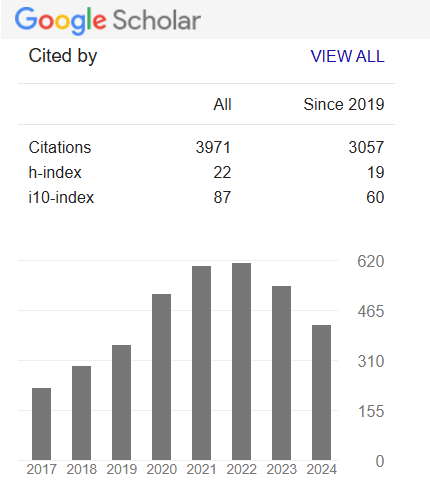Educational intervention in improving the Quality of Life of renal transplant patients
Keywords:
Quality Of Life, Renal Transplant, QolAbstract
Purpose: A study was done to develop and evaluate the effectiveness of an information booklet on “Healthy living after kidney transplantation” in terms of patients knowledge and quality of life (QOL) in renal transplant patients of selected hospitals of Delhi, India.
Methods and material: Structured questionnaire was the tool used. Content validity was obtained by giving it to nine experts. Reliability of tool was established prior to pilot study by KR-20 for knowledge questionnaire and Cronbach Alpha for QOL measurement scale. The subjects were approached personally in renal transplant clinic and pre test was administered on day one followed by the administration of the information booklet on the same day. On the day 15, post test was done. Data obtained was analyzed and interpreted in the light of objectives and hypothesis using descriptive and inferential statistics.Result: The study showed that 42% each were in the age group of 18-30 years and 31-50 years and most of the patients were male (72%) and many of them were not working (33%). The data also showed that thirty eight percent of them were educated up to graduate level and thirty nine percent of them had family income of Rs 5001- 20,000 per month. Most of them belong to joint family (63%). There was significant difference between the knowledge and QOL scores of patients before and after administration of information booklet. There was significant correlation found between the knowledge and QOL scores of the patients. The study revealed that there was significant association between knowledge scores of the patients with selected factors like age and education of the patients but there was no significant association between knowledge and factors life gender and occupation. The study also revealed that there was significant association between the QOL of the patients with selected factors like age, family income, duration of transplantation, source of donor, rejection episode, hospitalization, co-morbidities, duration of dialysis prior to transplant and procurement of medicines but it was found that this study doesn’t show any significant association of QOL with factors like type of family, number of transplantation and patient’s Body Mass Index.
Conclusion: It was concluded that the developed information booklet enhanced the knowledge of the post renal transplant patient on self care thus improving the QOL of these patients thus the information booklet can be used in different health care units and also in community for the renal transplant patients.
Downloads
References
Buttel FH, Wilkening EA, Martinson OB. Ideology and social indicators of the quality of life. Social Indicators Research. 1977 Jan; 4(1):353–69.
Chisholm MA, Spivey CA, Nus AV. Influence of economic and demographic factors on quality of life in renal transplant recipients. Clinical Transplantation. 2007;21 (2):285–293.
Farquhar M. Definitions of quality of life: a taxonomy. Journal of Advanced Nursing. 1995;22(3):502–8.
Fisher R, Gould D, Wainwright S, Fallon M. Quality of life after renal transplantation. J Clin Nurs. 1998 Nov;7(6):553–63.
Gordon EJ, Wolf MS. Health literacy skills of kidney transplant recipients. Prog Transplant. 2009 Mar;19(1):25–34.
Karam VH, Gasquet I, Delvart V, Hiesse C, Dorent R, Danet C, et al. Quality of life in adult survivors beyond 10 years after liver, kidney, and heart transplantation. Transplantation. 2003 Dec 27;76(12):1699–704.
Luk WS-C. The HRQoL of renal transplant patients. J Clin Nurs. 2004 Feb;13(2):201–9.
Mani MK. Chronic renal failure in India. Nephrol Dial Transplant. 1993 Jan;8(8):684–9.
Muthusethupathi MA, Shivakumar S, Damodaran K. Management of renal failure in India. A strategy based on peritoneal dialysis. J Assoc Physicians India. 1985 Oct;33(10):647–9.
Sayin A, Mutluay R, Sindel S. Quality of life in hemodialysis, peritoneal dialysis, and transplantation patients. Transplant Proc. 2007 Dec;39(10):3047–53.
Schmid-Mohler G, Albiez T, Schäfer-Keller P, Fehr T, Biotti B, Spirig R. [In-patient education after renal transplantation]. Pflege. 2011 Oct;24(5):317–28.
Urstad KH, Andersen MH, Øyen O, Moum T, Wahl AK. Patients’ level of knowledge measured five days after kidney transplantation. Clin Transplant. 2011 Aug;25(4):646–52.
White C, Gallagher P. Effect of patient coping preferences on quality of life following renal transplantation. J Adv Nurs. 2010 Nov;66(11):2550–9.
White Y, Grenyer BFS. The biopsychosocial impact of end-stage renal disease: the experience of dialysis patients and their partners. Journal of Advanced Nursing . 1999;30(6):1312–20.
Downloads
Published
How to Cite
Issue
Section
License
Copyright (c) 2019 Author

This work is licensed under a Creative Commons Attribution-NonCommercial-NoDerivatives 4.0 International License.
Open Access This article is licensed under a Creative Commons Attribution 4.0 International License, which permits use, sharing, adaptation, distribution and reproduction in any medium or format, as long as you give appropriate credit to the original author(s) and the source, provide a link to the Creative Commons license, and indicate if changes were made. The images or other third party material in this article are included in the article’s Creative Commons license unless indicated otherwise in a credit line to the material. If the material is not included in the article’s Creative Commons license and your intended use is not permitted by statutory regulation or exceeds the permitted use, you will need to obtain permission directly from the copyright holder. To view a copy of this license, visit http://creativecommons.org/ licenses/by/4.0/











